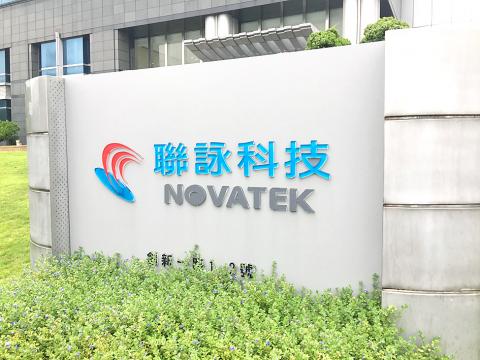Novatek Microelectronics Corp (聯詠) yesterday said revenue this quarter might grow as much as 1.8 percent from last quarter on the back of rising demand for TV system-on-a-chip (SoC) solutions, as the 2019 novel coronavirus outbreak has had a limited effect on its business.
Display driver ICs last quarter made up about 70 percent of Novatek’s revenue of NT$16.53 billion (US$549.75 million), said the company, which makes driver ICs for flat-panel displays.
“Our shipments have not been affected by the outbreak, despite inconveniences in transportation,” Novatek president and vice chairman Steven Wang (王守仁) told investors during a teleconference.

Photo: Grace Hung, Taipei Times
“Not all companies in Wuhan are in full operation. Some [customers] have only resumed 60 percent” of their capacity, Wang said.
Wuhan, where the outbreak is believed to have originated, is an important manufacturing site for Chinese flat-panel displays.
The outbreak would have a limited effect on the industry, as flat-panel display manufacturers continued operations during the Lunar New Year holiday, Wang said.
The outbreak’s effect on the supply chain is manageable, he said, adding that the company’s wafer suppliers and IC assembly and testing partners are reallocating capacity to Taiwan from China.
The company expects the outbreak to delay demand for smartphones due to transportation restrictions, rather than scaring off buyers, he said.
China accounts for half of Novatek’s revenue. The company has about 400 employees in China, mostly software developers.
All product development projects are continuing, Novatek said.
“If the outbreak can be well-controlled, the new product [smartphone] launches in April should not be affected,” Wang said.
Novatek expects shipments of its advanced touch controllers with display driver integration (TDDI) to grow annually this year, as most 5G smartphones are to be equipped with OLED screens that come with TDDI.
Worldwide TDDI shipments are expected to expand 18 percent annually to 650 million units from between 550 million and 600 million last year, the company said.
Novatek forecast revenue of NT$15.8 billion to NT$16.8 billion for this quarter.
“TV SoC demand looks quite good, as some customers keep placing orders, while driver IC demand appears flat,” Wang said. “Average selling prices are stable” for both products.
Gross margin is expected to be between 31 and 33 percent this quarter, compared with 32.25 percent last quarter.
Net income declined 12.22 percent annually and 11.25 percent quarterly to NT$1.8 billion last quarter.
Net income last year surged 24.05 percent to NT$7.93 billion from NT$6.39 billion in 2018, while earnings per share jumped from NT$10.5 to NT$13.03.

POWERING UP: PSUs for AI servers made up about 50% of Delta’s total server PSU revenue during the first three quarters of last year, the company said Power supply and electronic components maker Delta Electronics Inc (台達電) reported record-high revenue of NT$161.61 billion (US$5.11 billion) for last quarter and said it remains positive about this quarter. Last quarter’s figure was up 7.6 percent from the previous quarter and 41.51 percent higher than a year earlier, and largely in line with Yuanta Securities Investment Consulting Co’s (元大投顧) forecast of NT$160 billion. Delta’s annual revenue last year rose 31.76 percent year-on-year to NT$554.89 billion, also a record high for the company. Its strong performance reflected continued demand for high-performance power solutions and advanced liquid-cooling products used in artificial intelligence (AI) data centers,

SIZE MATTERS: TSMC started phasing out 8-inch wafer production last year, while Samsung is more aggressively retiring 8-inch capacity, TrendForce said Chipmakers are expected to raise prices of 8-inch wafers by up to 20 percent this year on concern over supply constraints as major contract chipmakers Taiwan Semiconductor Manufacturing Co (TSMC, 台積電) and Samsung Electronics Co gradually retire less advanced wafer capacity, TrendForce Corp (集邦科技) said yesterday. It is the first significant across-the-board price hike since a global semiconductor correction in 2023, the Taipei-based market researcher said in a report. Global 8-inch wafer capacity slid 0.3 percent year-on-year last year, although 8-inch wafer prices still hovered at relatively stable levels throughout the year, TrendForce said. The downward trend is expected to continue this year,

Vincent Wei led fellow Singaporean farmers around an empty Malaysian plot, laying out plans for a greenhouse and rows of leafy vegetables. What he pitched was not just space for crops, but a lifeline for growers struggling to make ends meet in a city-state with high prices and little vacant land. The future agriculture hub is part of a joint special economic zone launched last year by the two neighbors, expected to cost US$123 million and produce 10,000 tonnes of fresh produce annually. It is attracting Singaporean farmers with promises of cheaper land, labor and energy just over the border.

US actor Matthew McConaughey has filed recordings of his image and voice with US patent authorities to protect them from unauthorized usage by artificial intelligence (AI) platforms, a representative said earlier this week. Several video clips and audio recordings were registered by the commercial arm of the Just Keep Livin’ Foundation, a non-profit created by the Oscar-winning actor and his wife, Camila, according to the US Patent and Trademark Office database. Many artists are increasingly concerned about the uncontrolled use of their image via generative AI since the rollout of ChatGPT and other AI-powered tools. Several US states have adopted